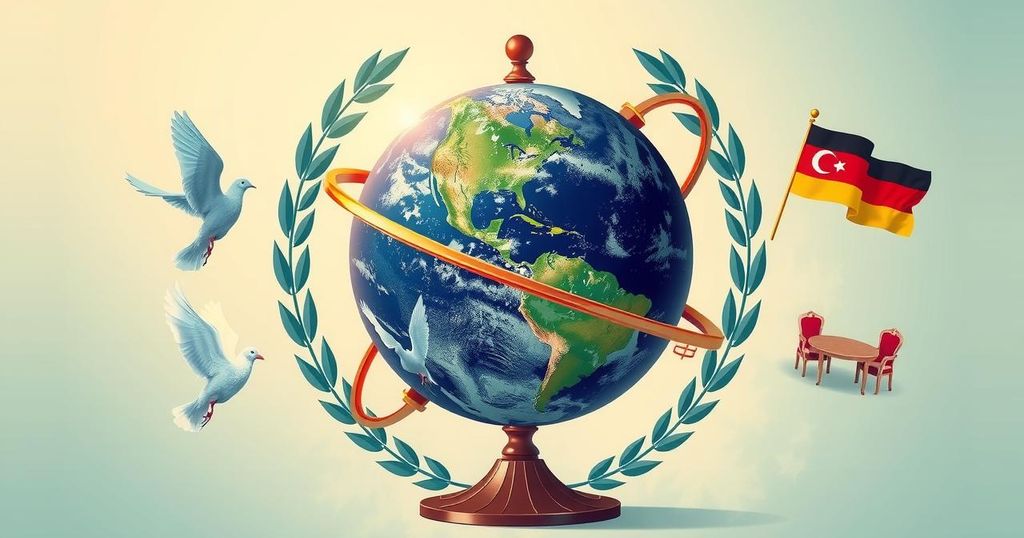China, through envoy Lu Shaye, has called for Europe and Ukraine to engage as equals in peace negotiations with the U.S. and Russia, signaling a departure from its historically passive approach. As the Ukraine conflict presents economic opportunities and challenges, China eyes the EU market as eastern relations evolve. Meanwhile, U.S.-China tensions rise, compelling China to adapt its strategic positioning in the global landscape.
In the complex dynamics of global diplomacy, China has recently articulated its desire for more equal participation in international negotiations. Lu Shaye, China’s special envoy for European affairs, emphasized that both Europe and Ukraine should assume active roles alongside the United States and Russia, indicating China’s discontent with existing negotiation frameworks that marginalize European voices. He stated that decisions regarding peace should not be dictated by a select few, highlighting the necessity for all relevant parties to be engaged in the dialogue.
This statement marks a notable shift in China’s longstanding strategy of cautious observation. As global relations evolve amidst a thaw in U.S.-Russia ties, China recognizes the need to reassess its diplomatic position. The era of passive engagement appears to be waning, compelling Beijing to assert its influence more actively in international matters.
The ongoing conflict in Ukraine has, paradoxically, yielded certain advantages for China. Through the war, Beijing has fortified its economic connections with Russia, acquiring discounted energy resources and supplying various goods. However, the changing U.S.-Russia dynamics pose a potential threat to China’s strategic interests, as improved relations could lead to a renewed presence of Western companies in Russia, jeopardizing Beijing’s economic foothold there.
Moreover, the Ukraine situation bears implications for Taiwan. Observing the global reaction to territorial annexations, China may consider leveraging this precedent to justify military action regarding Taiwan. This perspective aligns with China’s interpretation of international acceptance of territorial changes, now posing a challenge to regional stability in East Asia.
The foreign policy of China has traditionally drawn from Mao Zedong’s analogy of two fighting tigers, with China as the observer. Political analysts note that the ongoing conflict showcased Russia’s military shortcomings and revealed vulnerabilities within U.S. and NATO strategies, which some Chinese observers describe as “paper tigers.” This insight may embolden China’s ambitions, particularly concerning Taiwan, depending on future U.S.-Russian agreements.
As the geopolitical landscape shifts, China’s focus increasingly turns toward the EU market. Given potential trade conflicts with the U.S. and dwindling economic prospects in Russia if Western companies return, China identifies the EU as a critical ally. This pivot emphasizes the importance of European economic stability for China’s strategic planning moving forward.
Simultaneously, U.S.-China tensions are escalating. Chinese officials have explicitly warned the U.S. against trying to exert pressure while seeking amicable relations, indicating that such duplicity could destabilize bilateral ties. Echoing these concerns, remarks about readiness to confront the U.S. during trade disputes underline the tense atmosphere.
In conclusion, China’s evolving diplomatic strategy reflects its intent to reshape international negotiations while navigating complex geopolitical challenges. The assertion of equal standing in dialogue, economic ties to Russia, and the strategic importance of the EU signify a pivotal moment for China as it seeks to redefine its role on the world stage amidst growing tensions with the U.S.
China’s diplomatic posture indicates a significant strategy shift towards asserting its presence in global negotiations, particularly relating to the Ukraine crisis. The economic implications of the Russia-Ukraine conflict, alongside a focus on fostering relations with the EU, underscore the complexities of China’s foreign policy in an era marked by escalating U.S.-Chinese tensions. As China recalibrates its approach, the stakes for regional and global stability grow increasingly high, reflecting a shifting balance in international relations.
Original Source: news.az




